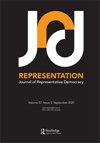性别平衡的代表和全球自由规范的侵蚀
Q2 Social Sciences
引用次数: 3
摘要
中国和其他非自由主义政权的崛起将如何影响全球自由主义规范的行为塑造能力?本文使用有关大使任命的最新二元数据来解决这个问题。它关注的是性别平衡代表的全球自由主义规范的命运。报告认为,当强大的国际合作伙伴低估性别平衡的重要性时,政府本身就不太可能优先考虑性别平衡。这种对合作伙伴规范点头的模式在结构依赖的较贫穷国家的政府中尤为明显。我们发现,在过去五年中,性别平衡的代表性规范已经受到侵蚀。在此期间,瑞典和德国等国加大了对全球自由主义规范的支持,但中国已成为越来越直言不讳的反对者。我们还发现,国家的国际权力地位——而不是其广泛的文化价值体系(例如“亚洲价值观”)——会影响伙伴国的做法。我们认为,除非新兴大国大幅调整其目前的行为,否则各国优先考虑女性政治代表权的压力将进一步减弱。本文章由计算机程序翻译,如有差异,请以英文原文为准。
Gender-Balanced Representation and the Erosion of Global Liberal Norms
ABSTRACT How will the rise of China and other illiberal regimes affect the behaviour-shaping power of global liberal norms? The paper uses updated dyadic data on ambassadorial appointments to address this question. It focuses on the fate of a global liberal norm on gender-balanced representation. It argues that when powerful international partners discount the importance of gender balance, governments become less likely to prioritise gender balance themselves. The pattern of nodding toward partners’ norms is particularly pronounced for governments of structurally dependent, poorer countries. We find that the gender-balanced representation norm has eroded in the last five years. In this period, countries like Sweden and Germany have increased their support for global liberal norms, but China has become an increasingly vocal opponent. We also find that countries’ international power positions—not their broad cultural value systems (e.g. ‘Asian values’)—affect partner countries’ approaches. We suggest that the pressure for states to prioritise women’s political representation will weaken further unless rising powers dramatically reorient their current behaviours.
求助全文
通过发布文献求助,成功后即可免费获取论文全文。
去求助
来源期刊

Representation
Social Sciences-Sociology and Political Science
CiteScore
3.50
自引率
0.00%
发文量
31
期刊介绍:
This change in scope follows two paths. Firstly, it seeks contributors who are interested in exploring the interface between democratic practice and theory. In particular, this focus seeks contributions that apply theoretical insights to actual examples of current practice. Secondly, while not neglecting the current focus of the journal, we would like to expand its international coverage so that the journal will offer our readers insights in the state of democracy worldwide.
 求助内容:
求助内容: 应助结果提醒方式:
应助结果提醒方式:


